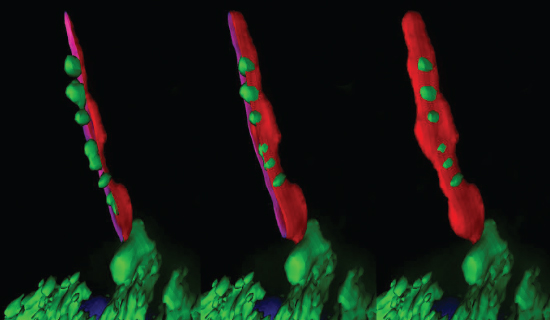
A three-dimensional reconstruction of three immunofluorescence images taken at different levels through the same fibroblast in culture. Visible are primary cilia (in red) and autophagy-related structures (in green) distributed along the cilia and at their bases. These structures appear to receive signals from the cilia that activate autophagy, which, in turn, regulates normal cilia growth. Compromised ability to activate autophagy may underlie genetic disorders of the cilia such as some forms of polycystic kidney disease and some forms of retinal degeneration. Photo by Olatz Pampliega, Ph.D.
instein scientists have discovered that nutrient deprivation links two key cellular processes, autophagy and ciliogenesis. (Autophagy involves degrading and recycling worn-out proteins and other molecules; ciliogenesis is the formation of cilia, the antenna-like structures that protrude from the cell surface.) A
paper in an October online issue of
Nature from the laboratories o
f Ana Maria Cuervo, M.D., Ph.D., and Peter Satir, Ph.D., demonstrated a reciprocal relationship between autophagy and ciliogenesis.
After nutrients were withheld, cell lines with compromised ciliogenesis experienced reduced rates of protein degradation due to defective autophagy. The researchers found that a particular signaling pathway mediates the relationship between the two processes. These findings suggest that the pathology underlying certain ciliopathies—diseases caused by defects in the function or structure of cilia—may result from impaired activation
of autophagy.
Dr. Cuervo is professor of
developmental and molecular biology, of
anatomy and structural biology and of medicine
(gastroenterology & liver diseases) and is the Robert and Renée Belfer Chair for the Study of Neurodegenerative Diseases. Dr. Satir is distinguished university professor of anatomy and structural biology. The paper’s first author was Olatz Pampliega, Ph.D., a postdoctoral fellow in the Cuervo lab.

